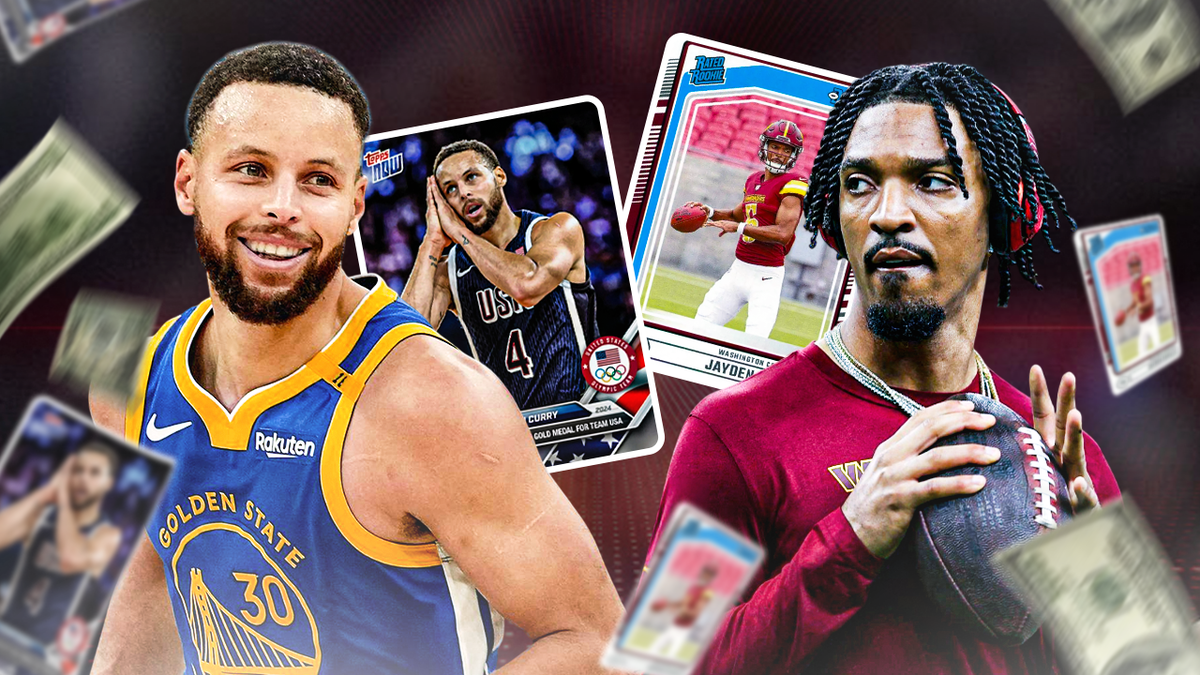

When Steph Curry’s Olympic Gold autograph card sold for $518K earlier this month, it wasn’t exactly a shock. The card world has been trending upward for years, steadily transforming from childhood hobby to high-end asset class. But it still made sense. A basketball legend, commemorated on cardboard, going for the price of a beachfront condo. But then came a twist: Giannis Antetokounmpo reportedly offered $1 million for a rare triple autograph card that features LeBron “King” James, Kevin Durant, and, of course, Steph. A million.
Watch What’s Trending Now!
Safe to say that if there was any doubt left that trading cards have entered the luxury investment tier, it should be gone now. But no. Just as the fans and collectors were digesting that, a team’s owner entered the collectibles market, literally. Do not think of it as a sponsorship for an auction or endorsing a brand. No, this time, an NFL team’s owner straight-up bought a rookie card for half a million dollars.
That’s how we landed at this week’s headline: the Washington Commanders‘ owner, Josh Harris, bought his quarterback Jayden Daniels‘ rookie card for $500K. Now, let’s face it—it might seem like a show of support for a player who just earned the Offensive Rookie of the Year. Or think of it like a quirky collector’s move. But there’s more at play here. This wasn’t just a fan buying a card. No. Don’t fall for that.
ADVERTISEMENT
It was an owner making a statement.
From hobby to high stakes: When cards became currency
There was a time when sports cards lived in the realm of sentimental value. Of course, there were a few high-dollar exceptions. Think of Honus Wagner, the great Michael Jordan rookies, the rarest of the rare. But there was a beauty in it because the average collector was all in for the thrill, not the payout. That all shifted in the 2010s, with the explosion of online marketplaces, grading companies, and an audience eager to spend on nostalgia.
ADVERTISEMENT
Then COVID-19 hit, and suddenly, a wave of this trend accelerated. People were stuck at home, chasing joy and liquidity in the form of PSA 10s and Chrome refractors. Fast forward to now, and cards are being treated like blue-chip stocks. It transitioned from who wants it more to who can pay more for it. Athletes are all in, and so are the celebrities. These cards are now a means to skyrocket the brand value of the players as well as the franchise. Collectors are no longer weekend warriors—they’re portfolio managers.
That’s why Steph Curry’s card crossed the half-million mark, and why Giannis saw a triple-signature card as worthy of a million dollars, literally. And if you zoom in, you’ll find that the key shift isn’t just in who buys the cards—it’s in what those cards now represent. These cards are no longer passive collector items. In fact, they’re now branding tools and cultural artifacts. To be more precise, sometimes, they’re speculative bets on what an athlete’s narrative might become.
ADVERTISEMENT
Billionaire buyers: Why team owners are entering the chat?
Enter Josh Harris. Buying Jayden Daniels’ rookie card isn’t just a show of support. Well, some might argue about it. But let’s face it—it’s something else. It’s an owner getting into the memorabilia space, and potentially using it as a way to elevate or signal belief in his franchise’s future centerpiece.
Top Stories
Cowboys Fire Defensive Coordinator Matt Eberflus: Contract, Salary, NFL Earnings & More

Russell Wilson Announces Retirement Stance as Giants QB Shares Hidden Injury News

Dolphins Reportedly Indecisive About Mike McDaniel as GM Search Kicks Off

Joe Flacco Makes Retirement Decision Clear as Bengals QB’s Final Gesture for Ja’Marr Chase Draws Attention

Brian Schottenheimer Calls Out Controversial Jaxson Dart Incident as Cowboys Star Awaits NFL Punishment

Wow: Commanders owner Josh Harris buys a 500 THOUSAND DOLLAR Jayden Daniels card in a historic sale.
What a special moment captured 😱pic.twitter.com/JBJlwmxaVF
— Dov Kleiman (@NFL_DovKleiman) June 22, 2025
ADVERTISEMENT
You won’t find it as a common practice in the sports world, especially in the NFL. Their support comes through resources, front office backing, and infrastructure. Count fancy contract extensions based on the quarterback’s performance as well. But memorabilia? That’s a usual thing for fans and investors. Not the owners. There’s a fine line between fans/investors and team owners. And by stepping into this world, Harris is blurring the line between traditional ownership and brand activism.
See it this way: the Commanders’ owner has made his fortune in private equity. Understanding long-term assets and how to create future value is like a walk in the park for him. So, is it really a stretch to think this card purchase is less about Daniels’ past and more about shaping his future? Because let’s clarify one thing, that card, after all, isn’t just a collectible now. It’s a marker of belief—and potentially a driver of value, for both the player and the franchise. Not to mention, Daniels is just in his second year in the NFL.
ADVERTISEMENT
Flex or future asset? Trading cards in the billionaire era
Harris’ purchasing Daniels’ rookie card can be read in two ways. On one hand, it’s a charming gesture for your quarterback you’re investing in, who’s your team’s future, buying into the hype and standing behind his pick. Fans will be excited, and Daniels’ teammates will appreciate it. Harris believes in his QB so much that he put down half a million for a card.
But on the flip side of the spectrum, this purchase is telling a different tale, and an expensive one that has a long-term effect. It’s a sharp business today. In a time when attention is currency, owning one of the most valuable rookie cards in football could serve multiple purposes.
- Attracting fan engagement.
- Increasing the perceived value of the player. Who knows, Daniels goes on to win the Super Bowl next year.
- And perhaps, even controlling a piece of his narrative arc.
ADVERTISEMENT
If Jayden Daniels becomes a star (builds a Commanders dynasty), then Harris doesn’t just own the team he plays for—he owns a piece of the mythology, too. Again, it’s a sharp business. Which is precisely why the owners are entering the chat. When people like Giannis are offering seven figures for a piece of cardboard, and owners are into the mix as well, the lines between collector, fan, investor, and stakeholder are starting to blur. Maybe this isn’t about cards anymore. Maybe it never really was.
The bigger question now is still looming: Are trading cards new stock options—and are billionaires just ahead of the curve in turning them into cultural capital?
ADVERTISEMENT
ADVERTISEMENT
ADVERTISEMENT

